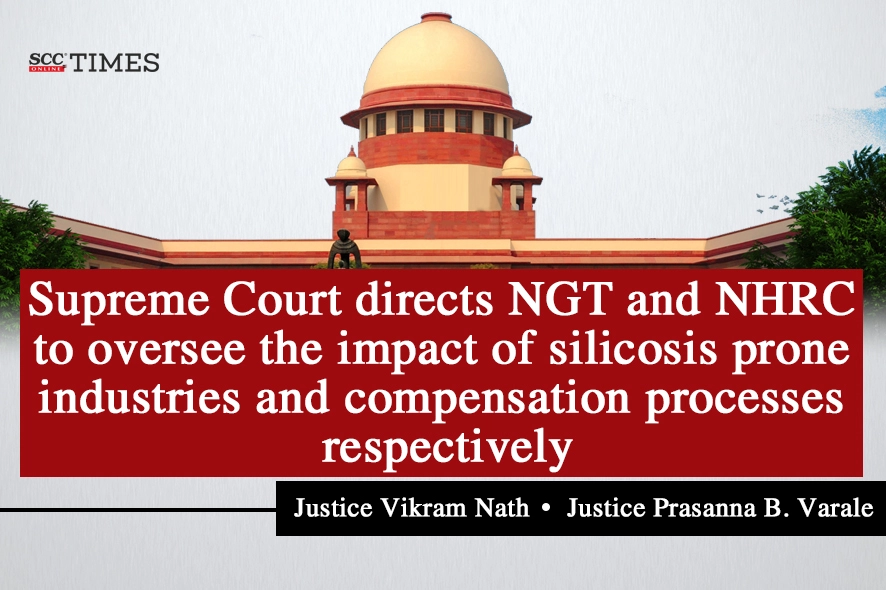Supreme Court: While considering the instant petition filed by People’s Rights and Social Research Centre, a Delhi based NGO seeking intervention vis-a-vis addressing the grave issue of “Silicosis” among workers in various industries across the country; the Division Bench of Vikram Nath* and Prasanna B. Varale, JJ., directed National Green Tribunal (NGT) to oversee the impact of silicosis prone industries and factories across India and ensure that the Central and State Pollution Control Boards comply with the earlier directions of the Court. The Court also directed the National Human Rights Commission (NHRC) to oversee the compensation process across the respective States.
Background: People’s Rights and Social Research Centre which has been actively involved in occupational health work, specifically concerning stone crusher workers, stone quarry workers and construction workers, filed the petition in 2006 to underscore the urgent need for systemic reforms to address the detection, prevention, and treatment of silicosis to protect the health and rights of workers across the country.
Silicosis is an incurable occupational lung disease caused by prolonged inhalation of silica dust, and it has been rampant throughout India due to inadequate detection, monitoring, and remedial measures. It predominantly affects workers engaged in industries such as mining, construction, stone cutting, and sandblasting, where they are exposed to high levels of silica dust. Over time, the inhaled silica particles cause inflammation and scarring of the lung tissue, leading to reduced lung function and severe respiratory distress. Despite its preventable nature through adequate safety measures, monitoring, and use of protective equipment, the lack of stringent enforcement and awareness have resulted in a significant number of workers contracting this debilitating disease.
The petitioner contended that unchecked prevalence of silicosis among workers in various industries constitute a violation of the workers’ fundamental rights under Article 21 of the Constitution. Furthermore, the petitioner invoked the Directive Principles of State Policy, particularly Articles 39(e) and 42 of the Constitution which mandate the State to ensure that the health and strength of workers is not abused and that citizens are not forced by economic necessity to enter avocations unsuited to their age or strength. The petitioner also referenced Article 43 of the Constitution, which directs the State to ensure a living wage, conditions of work ensuring a decent standard of life, and full enjoyment of leisure and social and cultural opportunities for workers.
The petitioner thus sought directions and guidelines to address the gravity of the situation.
Court’s Assessment:
The Court perused the trajectory of the instant petition since 2006, and the orders issued by the Court to various government organizations. The Court also perused reports submitted by the respective State Committees, the NHRC, the Central Pollution Control Board (CPCB), and the Director General of Mines Safety (DGMS). Hence, the Court pointed out that the instant case involves 2 aspects- Environmental and Adequate Compensation.
Vis-a-vis the Environmental Aspect, the Court opined that the NGT is the appropriate authority to oversee this aspect of the matter. The NGT, established under the National Green Tribunal Act, 2010, has been tasked with the expeditious disposal of cases related to environmental protection and the speedy implementation of decisions. Considering that the instant writ petition was filed in 2006, prior to the establishment of the NGT, therefore, these matters could not have been presented before the Tribunal initially. Hence, the Court directed the NGT to oversee the impact of silicosis on industries across the country and take additional necessary steps to prevent the spread of this disease.
Vis-a-vis the aspect related to Compensation to the affected workers and their next of kins, the Court directed the NHRC to oversee this aspect. The Court also directed the ESIC and the Chief Secretaries of the respective States to adhere to the directions of the NHRC and collaborate with them to ensure that the compensation distribution process is carried out efficiently and without delay.
Finally, the Court directed the Registry to ensure that all the relevant reports and affidavits pertaining to this matter, as submitted by the respective State Committees, the CPCB, the NHRC, and the DGMS, are forwarded to the NGT and the NHRC to facilitate the execution of their responsibilities effectively and swiftly.
CASE DETAILS
|
Citation: Appellants : Respondents : |
Advocates who appeared in this case For Petitioners: For Respondents: |
CORAM :









